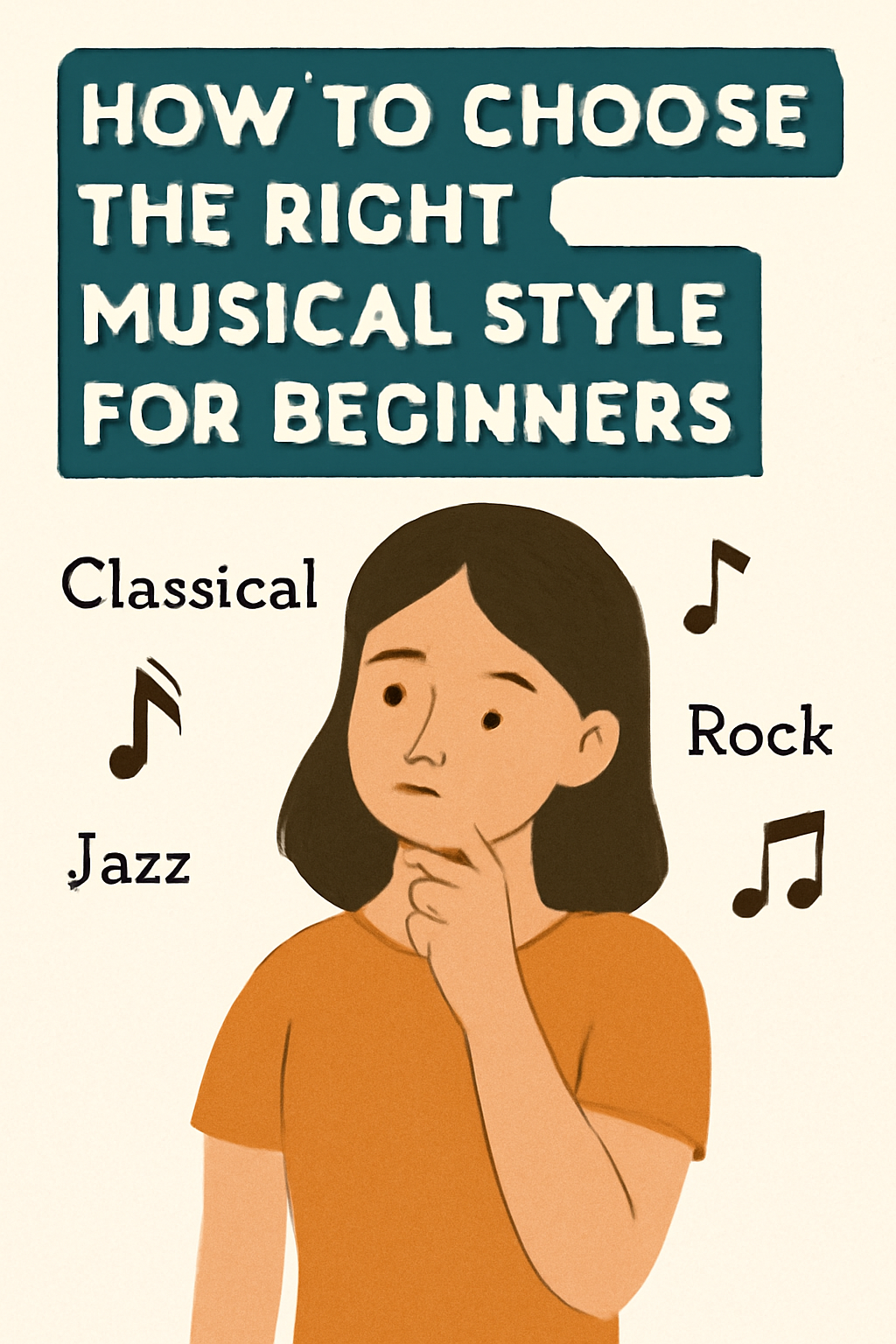When you’re first starting out on your musical journey, one of the most exciting decisions you’ll face is choosing which musical style to learn. Whether you’re learning to play an instrument or develop your singing skills, selecting a musical style that resonates with you can greatly enhance your motivation and overall enjoyment of the learning process.
But how do you decide which musical style is right for you, especially when there are so many genres to explore? This article will help you navigate the process by considering your interests, goals, and the different aspects of each musical style. We’ll look at various genres, their characteristics, and the benefits of choosing the right style to begin with.
Why Your Musical Style Choice is Important
Choosing a musical style to focus on early in your learning journey can have a significant impact on your overall development. Here are a few reasons why the style you choose matters:
- Motivation: It’s easier to stay motivated when you enjoy the music you’re learning. Choosing a style that excites you keeps you engaged in practice.
- Techniques: Different genres emphasize different techniques. For example, jazz focuses on improvisation, while classical music emphasizes precision and timing. Choosing the right style helps you develop the techniques you’ll need for your instrument or voice.
- Personal Connection: Music is a deeply personal experience. The style you choose should resonate with you emotionally and reflect your own tastes. Playing music you love helps create a stronger connection to the instrument and the learning process.
How to Determine Which Style is Right for You
There are several ways to approach the decision of which musical style to focus on. Here are some factors to consider:
1. Your Musical Interests and Preferences
The first and most important factor is your personal taste. Think about the music you listen to regularly. What artists or bands do you enjoy? What genres do you find yourself gravitating toward? Your music preferences will give you a good indication of which style you might enjoy learning.
For example, if you love rock music, you might enjoy learning to play guitar or drums. If classical music captivates you, you might prefer starting with the piano or violin. Start by asking yourself: What type of music excites me the most?
2. Your Instrument of Choice
The instrument you choose plays a big role in determining which musical style will be most suitable for you. Some instruments are more commonly associated with certain genres:
- Piano: Classical, jazz, pop, and contemporary music
- Guitar: Rock, blues, jazz, country, and folk
- Violin: Classical, folk, and bluegrass
- Drums: Rock, jazz, funk, and pop
- Saxophone: Jazz, blues, and contemporary music
While you can certainly play any genre on any instrument, certain styles are more accessible based on the instrument you’re learning.
3. The Techniques and Skills You Want to Learn
Different musical styles require different skills and techniques. For example, if you’re learning guitar, you’ll need to choose between fingerpicking (common in folk and classical music) and strumming (common in rock and pop). If you’re learning to sing, you may need to decide whether you want to focus on classical voice training or contemporary vocal techniques.
Here’s a brief look at the skills required in some popular genres:
- Classical Music: Requires precise technique, sight-reading, and understanding of musical notation.
- Jazz: Focuses on improvisation, rhythm, and a deep understanding of harmony.
- Rock: Often involves power chords, rhythm playing, and an emphasis on expression and energy.
- Pop: Focuses on catchy melodies, easy-to-learn chord progressions, and vocal harmony.
- Blues: Emphasizes improvisation, emotional expression, and mastering the blues scale.
By understanding the techniques you’ll need to master, you can better decide which style aligns with your goals.
Popular Musical Styles for Beginners
Now that we’ve discussed the key factors to consider, let’s dive into some popular musical styles and why they might be a good fit for beginners.
1. Pop Music
Pop music is one of the most accessible genres for beginners. With its simple structures and catchy melodies, pop songs are often easy to learn, especially for piano, guitar, and voice. Many pop songs use basic chords and are written in a way that is easy for beginners to understand.
If you’re a beginner looking for a genre that is familiar, fun, and relatively easy to play, pop is a great choice.
2. Rock Music
If you’re drawn to energetic performances, loud guitars, and powerful drumming, rock music might be your go-to genre. Rock often uses straightforward chord progressions, and beginner guitarists and drummers can quickly learn many popular rock songs. Rock also allows for self-expression and creativity, especially when you start improvising and playing solos.
If you like bold, high-energy music and want to learn an instrument like the guitar or drums, rock is an excellent choice.
3. Classical Music
Classical music offers a more structured approach to learning an instrument, making it a great genre for beginners who appreciate discipline and technique. Classical music helps you develop sight-reading skills, understanding of musical theory, and precision.
While it can be more challenging for absolute beginners, classical music is perfect for those who are willing to invest the time and effort into mastering their instrument and learning complex pieces.
4. Blues
Blues music is deeply expressive and emphasizes improvisation. It’s a great genre for beginners because the basic blues scale is relatively easy to learn and play, and many of the songs are based on simple, repetitive structures.
If you enjoy improvising and want to explore emotion through music, blues could be a rewarding genre to learn.
5. Jazz
Jazz is a great genre for those interested in improvisation and complex rhythms. While it can be challenging for beginners, it offers immense rewards in terms of musicianship. Jazz focuses on harmony, rhythm, and creativity, and it encourages you to explore your personal musical style.
If you’re interested in learning advanced techniques and enjoy improvising, jazz is a wonderful choice.
How to Explore Different Styles Before Committing
If you’re unsure about which style is right for you, try exploring different genres before committing. You can:
- Listen to a variety of music: Spend some time listening to different genres, paying attention to the instruments and the structures of the music.
- Try playing different styles: If you play an instrument, try learning simple songs from different genres. This will give you a feel for the techniques and skills involved.
- Take introductory lessons: Some music teachers offer introductory lessons in a variety of styles, which can help you decide which one you’re most interested in.
Choosing the right musical style is a personal decision that will significantly influence your learning experience. Take the time to explore different styles, reflect on your interests, and consider the skills you want to develop. The genre you choose should resonate with you and keep you excited to practice and improve.
Whether you opt for pop, rock, classical, jazz, or blues, remember that the most important thing is to enjoy the music you’re learning. Your passion will drive you to practice, improve, and ultimately become a better musician.




